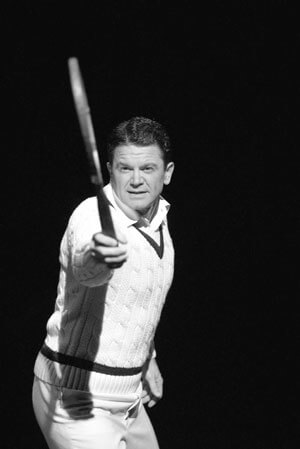A.R. Gurney’s play can’t get its arms around tennis great Bill Tilden
Next to soccer players, tennis players are the sexiest athletes. They’re lithe, quick on their feet and have a temperamental flair for the dramatic.
When Pete Sampras uses his shirt to wipe off his brow during a match, it is, to put it mildly, a moment.
But plays about tennis are practically non-existent. That’s why I was looking forward to “Big Bill,” A.R. Gurney’s historical exploration of the life of seven-time U.S. Open champ Bill Tilden, the first real superstar in tennis.
Tilden was at the top of his game in the 1920s and 30s, and is remembered today by aficionados of tennis as one of its most accomplished players. But he was also twice convicted of having sex with teen boys in the 1940s. In 1953, at the age of 60, he died broke and alone in Hollywood.
If Tilden’s life story is now mostly forgotten, it’s nonetheless a fascinating piece of history, gay or otherwise, that seemed ripe for the stage. Unfortunately, “Big Bill” isn’t the show to do Tilden’s story justice.
Gurney seesaws through the events in the life of the mild-mannered Tilden (John Michael Higgins) with mania, from the athlete’s crowd-pleasing matches to his courtroom appearances to his untimely death. Through Gurney’s eyes, Tilden is alternately an angel, a gentleman, a pederast, an actor, a celebrity, and a basket case, often in the same scene.
An exposition-heavy script weighs down the action, which dashes through randomly gathered moments from Tilden’s life with the clinical touch of an overwritten celebrity biography. Most of the show’s 90 intermission-less minutes were used to recite facts and figures from Tilden’s life, written with little nuance but with every effort to have the actors bound on and off the stage with costume changes at every entrance.
Then there’s the matter of sex., which Gurney approaches very gingerly. A relationship between a 30-year-old man and a 16-year-old boy can involve nuanced questions about seducer and seduced, which the playwright never explores, perhaps out of fear that audiences would be offended if he seemed to be linking homosexuality and pedophilia.
The show is visually de-gayed as well. The only same-sex imagery comes when Tilden wraps his arms around a young man to show him how to grip a racket; in another scene, a male fan does a very poor job of not quite coming on to Tilden. Although brief, these moments nonetheless energize an otherwise passionless production.
Higgins, the straight actor best known for his hilarious gay turns in the film “Best in Show” and in the title role in Paul Rudnick’s play “Jeffrey,” reprises the role from last year’s Williamstown Theatre Festival in Massachusetts. Here he does an amazing job breathing life into a character that defies categorization, smoothly mixing the awkwardness of a man who hasn’t quite grown up––his performance reminded me of a more mature Ned Flanders from “The Simpsons”––with the breezy, if forced, self-confidence of a celebrity.
Playing various characters, including an umpire and a judge, the always-reliable David Cromwell also rises above the material. Margaret Welsh, however, brings a bland sameness to the show’s female characters.
Director Mark Lamos runs a tight ship, which, unfortunately is exactly what Gurney’s busybody script calls for. It was mighty hard to keep focused when the actors were so busy helping out with costume changes (kudos to Jess Goldstein for the pitch-perfect threads) and moving a single table on and off the set (John Lee Beatty’s grassy tennis court unconvincingly doubled as a courtroom). The play felt like a film, what with all the nonstop commotion.
Tilden’s life story, rife with themes of sadness and loneliness common to gay men’s coming-of-age stories of his day, is one the gay community might have a hard time embracing. Gurney sure did, albeit for different reasons, which makes this play a missed opportunity to recover a tragic, but enlightening piece of one gay man’s life.



































